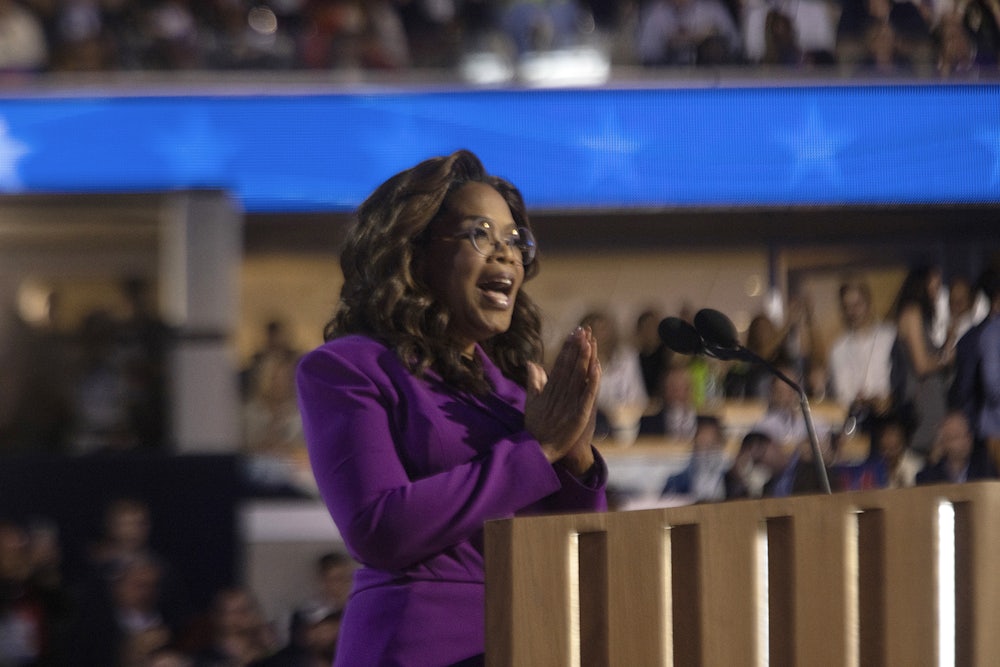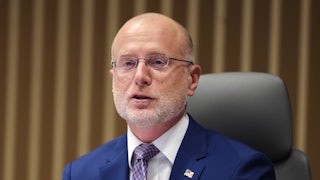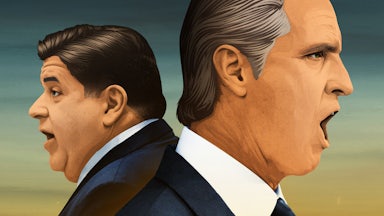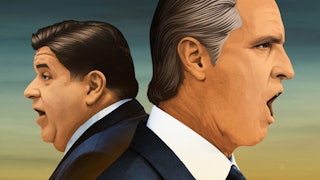Rumors that Beyoncé would make an appearance were swirling inside the United Center by the third day of the Democratic National Convention. They hit TMZ a day later. But by the time balloons fell upon Kamala Harris, Tim Walz, and the Democratic delegates, Beyoncé was nowhere to be found. Nor was Taylor Swift, the subject of far less serious speculation about a “surprise guest”—teased by dubiously sourced posters on the social media site X—who failed to materialize. (Arguably, the surprise guest was actually the newly minted nominee, Vice President Kamala Harris, who had rocketed to the top of the Democratic ticket barely a month before.)
But attendees could hardly complain about the roster of celebrities who were in attendance. Rapper Common performed a version of his song “Fortunate,” tailored to fit the DNC. (“I thank God for this moment in time where Kamala Harris will change the world for the better with love, hope, and grace,” the rapper declared.) Legendary singers Patti LaBelle and Stevie Wonder performed some of their biggest hits. Singer John Legend and drummer Sheila E. delivered a tribute to the late artist Prince that doubled as an opening act for Harris’s running mate, Governor Tim Walz, who also hails from Minnesota. For the country-loving crowd, Mickey Guyton, Jason Isbell, and the Chicks all made appearances.
Rapper Lil Jon, a Georgia native, participated in his state’s roll call vote to formally name Harris the nominee; actress Eva Longoria, who was born in Corpus Christi, did the same for Texas. (Jon performed his hit “Turn Down for What” but did not perform his frat-party standard “Get Low,” which famously details the sweat dripping down a certain anatomical region.) Pink performed alongside her daughter and backup singers for a mournful, acoustic version of her song “What About Us.” Actors Kerry Washington and Mindy Kaling delivered remarks, and basketball star Stephen Curry appeared in a pretaped video; on night one, August 19, his coach, Steve Kerr, spoke about the value of teamwork. Celebrities could also occasionally be spotted on the floor of the arena: Oh look, there’s Mark Hamill, there’s Rosario Dawson, there’s Spike Lee—who looked generally more excited than he does when he sits courtside at Knicks games.
Of course, convention attendees are exactly the sort of nerds who would consider a powerful politician a celebrity. Former first lady Michelle Obama, former President Barack Obama, former Democratic presidential nominee Hillary Clinton, and Senator Elizabeth Warren were received with rapturous cheers. When 78-year-old former President Bill Clinton took the stage on night three, the reception was akin to that of fans of 81-year-old Mick Jagger; sure, he may be older and diminished, but it’s Mick Jagger. (On the floor, one delegate said he would have voted for Clinton a third time if he could; several within earshot concurred.) The smorgasbord of famous people provided a sharp contrast to the Republican National Convention the month before. Democrats are generally smug about the quality and level of renown of their ideologically aligned celebrities as compared to those who support Republicans. (Unfortunately for Democrats, the U.S. Constitution does not grant George Clooney more weight in the Electoral College than your average Trump supporter.)
Just one comparison: The RNC had wrestler Hulk Hogan extolling former President Donald Trump’s toughness and ripping his shirt off onstage; the DNC featured a surprise speech by Oprah Winfrey. There is a measurable sociological impact of Winfrey’s economic and political endorsements, aptly called the “Oprah Effect”; if there’s a “Kid Rock effect,” it hasn’t been studied yet.
“I’m calling on all you independents and all you undecideds,” Winfrey said in her speech on night three, turning her watchful eyes far outside the boundaries of the United Center. “You know I’m telling you the truth that values and character matter most of all in leadership and in life, and more than anything—you know this is true—that decency and respect are on the ballot in 2024.”
Although Beyoncé did not personally attend the DNC, her presence was still felt in the United Center arena on the fourth and final night, when Harris walked onstage to the singer’s 2016 song “Freedom”—which was played roughly 10,000 times over the DNC’s four days. As Beyoncé gave the Harris campaign permission to use that song for campaign purposes, it is a tacit endorsement—in contrast to the Trump campaign, which is frequently asked by artists to stop using their music.
The Democrats had so many celebrities, they could even afford to lose them. When festivities ran long on evening one, James Taylor was bumped so that Joe Biden could get on stage before midnight EST. Taylor is arguably more famous than any of the pop culture figures who attended the RNC. In Chicago, his absence was barely noted.






